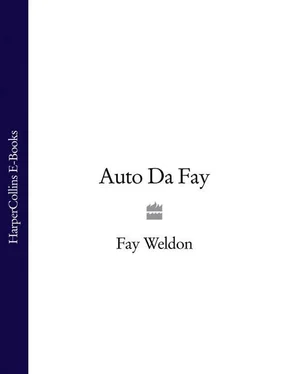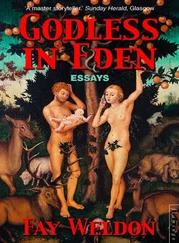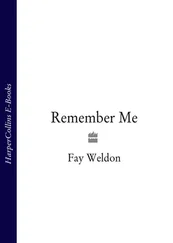This was the first of the three great blows that the Life Force, that male conceit, was to deal Nona during the course of her life. The second was when her daughter Faith was discovered in love and in bed with her Uncle Hjalmar. Free Love was for the paterfamilias, on the whole, not for the rest of the family. The ensuing mayhem was to drive Faith into a mental home, where she died some fifteen years later. Edgar visited her weekly, but Nona went into a denial so profound that she blotted Faith, poor Faith, out of her consciousness entirely. When she was in her eighties, and I showed her a photograph of her three extraordinarily beautiful children, taken in about 1912, she could still see only two of them. And the third blow from the Life Force was when Edgar made Lois pregnant, and Nona was back to where she began, living with her mother.
It was hard for the family to see what Edgar saw in Lois. She was conventional and without any noticeable grace or talent, at least compared to Nona. She was a great complainer, about everything from her marriage, to the weather, to the state of her electric blanket. But perhaps her very difference from Nona was a relief to Edgar. She could look after herself. She made demands. ‘We never quarrelled,’ wrote Edgar of Nona, in 1937, by which time he was married to Lois, and their daughter Jennifer was six, ‘I do not believe that she could quarrel…When we were young we were always hard up, and she had but a poor time of it. She never complained, not once. Sometimes she would look wistfully at a frock or a hat in a shop window, or at a hansom when she was tired, and that wistfulness I do not forget.’ Perhaps that passage was written as a subtle reproach to Lois, as a suggestion that she mend her ways, and do as well in this respect as his first wife. Writers are not above sending coded messages to their spouses in their books.
In my teenage I went to the same school as Jennifer, but she was my aunt and the same age as me, though in a junior year, so it seemed prudent for us to ignore each other’s presence, and no one ever knew we were related. We both still live within a mile of Adelaide Road, and these days enjoy a cordial relationship.
Nona’s home collapsed when she was eighteen, thanks to her father Henry’s behaviour, and so, homeless, she married Edgar. Her daughter Margaret’s home collapsed when she was eighteen, thanks to her father Edgar’s behaviour, and so, homeless, she married Frank. My mother collapsed her own house the month I turned eighteen, and left me homeless, and had there been a suitor around I’m sure I would have married him, but there wasn’t. I just hung around for a couple of years, rendered myself pregnant and thereby drew my mother back to me, and Jane did the same.
I made a real effort to break the run of compulsive behaviour – doing unto others as you have been done – and desist from rendering my own children homeless just at the wrong moment, but did not altogether succeed. Jane did it to hers by dying. The Life Force, once it’s set going, runs through families for generations, and causes terrible havoc. ‘I blame Arthur Machen,’ said Nona to me one day. ‘He cast too many spells.’ But I daresay Freud could have produced a more rational answer, and Arthur Machen frightened himself by his own necromancy, my mother said, and though he never lost his allegiance to the Old Gods of his native Wales, concluded that they had lost their powers in the new world, and there was no point in dabbling.
My mother was not sent to school. That is to say when she was five they tried to take her and she refused. Her father came downstairs from his study wearing his silk dressing-gown and smoking a cigarette in an ivory holder, and said, ‘What can be the matter with little Margaret. She’s making such a noise!’
‘She won’t go to school,’ Nona said.
‘Do you not want to go to school?’ Edgar asked his daughter.
‘No,’ she replied.
‘Then don’t send her,’ he said and turned and went up the stairs again. And that was the end of my mother’s formal education, apart from a couple of terms at the Slade School of Art when she was fifteen. She told me she knew at the time it was a major life decision and she had chosen wrongly. Her failure to go to school made her over-respectful of authority, I think, and she never felt permitted to lie when she filled in a form, though brave enough in other respects, and she never learned to deal with what she didn’t like: all the important things one learns at school. They tried her again at the age of nine, but after a week of lessons she refused to go any more. She already knew everything they were trying to teach her.
Edgar’s account of it runs thus: ‘My daughter Margaret at the age of nine refused to go to school because it bored her, and it proved to be the wise course. Neither Susan or I [alas, for the poor forgotten Frieda, now subsumed into wife and mother ‘Susan’] could conceive of any reason why she should go to school, and we raised no objection to her staying away from it. I do not know whether she regrets it…but she writes better if gloomier novels than Selwyn or I, both of whom suffered seven years’ schooling apiece, and if you doubt my judgement, read her V ia Panama.’
In the three weeks after my birth, after Margaret had succumbed and gone to stay at Adelaide Road with her father and her new stepmother, and before she took the ship back to my father, Edgar and she managed to write a book between them, Miss Amagee in Africa. ‘I shouldn’t have gone to stay with them,’ my mother said later. ‘It hurt Nona very much.’ But her own attitude to her mother was ambiguous. Her sister Faith had been betrayed by Nona, she sometimes hinted that Nona had been too fond of Frank: the clamour for emotional justice and the need to love battled it out.
Miss Amagee in Africa, of course, shows no sign of emotional stress: it is a stirring adventure tale about a brave American woman outfacing lions in Africa, written on the hoof, as it were, with wonderful descriptions of a landscape which neither writer had ever seen. I can only imagine that Lois was left to look after Jane and myself, and Jennifer too, while Edgar and Margaret worked. If so much was to get written in so short a time, someone had to look after the children.
And then it was time for Margaret to go home, though no one wanted her to go – except, I daresay, Lois. Frank was waiting impatiently for his wife and children to return. He had found a practice in the South Island, inland from Christchurch, at a township called Amberley, in the heart of the flat wheatlands of the Canterbury Plain. It was going to be all right, he assured her in his letter. He was starting a radio station. And he was standing for parliament as the socialist candidate.
Of Amberley, I remember the hot wind blowing off the mountains, day after day, and a bare flat landscape, and a lot of sheep there was no escaping. I remember being dressed up as Little Miss Bo Peep for a fancy-dress party. I remember the creaking of the windmill which pumped our water, and the hot dust beneath the macrocarpa hedge which you had to wriggle through to get to play with the children next door. I remember the milk being warm when it came from the cow, and wishing it wasn’t. I remember the day I learned to read – I was three – and the way the letters suddenly made sense, and the excitement of that. I remember thinking now I could catch up with Jane but of course I never could. I remember my father coming home with a big new gold car, and how proud he was of it. It was a Voisin, imported from France; it had a starting handle and running boards on which we were allowed to stand. It was a magic car: I was sure it could fly, one day it would take off into the sky. But my father had a trick which I hated: he would stop the car in the middle of a dry river bed and tell us how we had to beware them, how people would camp the night in them, and be swept away in the darkness as the flood swept down from the melting mountain snows.
Читать дальше












